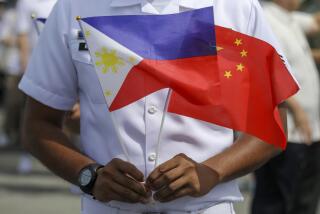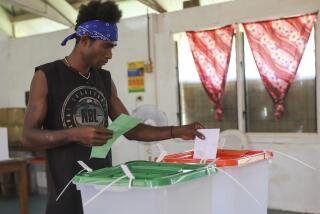Cook Islands gives some detail of its China deal that has upset close partner New Zealand

- Share via
WELLINGTON, New Zealand — The South Pacific country of Cook Islands on Tuesday unveiled the details of a deal with China to boost cooperation on matters including mining seabed minerals after the pact provoked a rare diplomatic clash with the nation’s chief benefactor, New Zealand, and protests at home.
The public quarrel between New Zealand and Cook Islands — which share a passport, a military and constitutional ties — was a victory for Beijing’s efforts to woo Pacific leaders and a blow to Western countries’ efforts to counter China’s sway, analysts said.
The deal does not mention joint security initiatives, unlike others China has made with small South Pacific nations. Cook Islands Prime Minister Mark Brown signed it during a visit to Beijing this month. It also gives few details on the partnership such as promised funding from China.
Mihai Sora, director of the Pacific Islands Program at the Lowy Institute, an Australian think tank, said the controversy reflected “an intense geopolitical contest for influence.”
Refusal to share details
Cook Islands, with a population of 15,000, a tourism economy and a large exclusive economic zone, is a self-governing country in free association with New Zealand, which provides the bulk of development funding. The arrangement promises New Zealand’s help with military and foreign affairs.
In return, Cook Islands must consult New Zealand on any matters that could affect Wellington.
Brown’s refusal to show New Zealand officials the text of the China deal ahead of his trip prompted censure from Wellington this month.
And about 400 people protested at the Cook Islands parliament in the capital, Avarua, on Tuesday after Brown returned from China, according to news outlets there. Footage showed demonstrators carrying placards that read “stay connected to New Zealand.”
Other pacts remain secret
The five-year strategic agreement between Beijing and Avarua was the only document released publicly by Brown, who earlier said he would sign multiple agreements.
The strategic partnership pledges more funding from China for infrastructure projects and educational scholarships. Cook Islands will help China secure preferential treatment at regional meetings of Pacific nations.
The deal “does not replace our longstanding relationships with New Zealand, Australia and others, but rather complements them, ensuring that we have a diversified portfolio of partnerships,” Brown told parliament on Monday.
Sora, the analyst, said leaders of small island nations who believe they can “outsmart the Goliath policy and operational engines” of Beijing either have more resources than they let on or have “false confidence” about their ability to avoid being compromised.
New Zealand still cautious
New Zealand Foreign Minister Winston Peters was cautious about endorsing the deal on Tuesday. A spokesperson said the government would review the text before commenting, and urged Brown to publish any other pacts he signed.
“Consultation and transparency must lie at the heart of the New Zealand-Cook Islands relationship,” the spokesperson said in a statement.
Brown has said he did not believe he needed to supply agreements’ precise wording.
Beijing’s Pacific interest
The pace of China’s deals in the Pacific has escalated in recent years as island nations that once recognized Taiwan have switched their diplomatic ties to solely acknowledge Beijing. That leaves Taipei with few remaining allies. Such moves are often followed by bilateral deals pledging cooperation.
Australia and New Zealand, the region’s biggest donors, have security concerns. Some pacts — including those Beijing signed with Solomon Islands and Kiribati — have never been publicly shared.
“The reason that this one has been public I think is for the optics of the diplomatic victory that China can claim in having won over the Cook Islands to this level of intimacy,” Sora said.
Second dispute in a month
This is the second Pacific dispute in a month for New Zealand, which in January said it was reviewing all development funding to Kiribati after Peters’ office said he was snubbed by the island nation’s president ahead of a planned trip.
Taneti Maamau denied he had planned to meet with Peters personally. Kiribati has drawn increasingly close to China since severing diplomatic ties to Taiwan in favor of Beijing in 2019.
Graham-McLay writes for the Associated Press.










